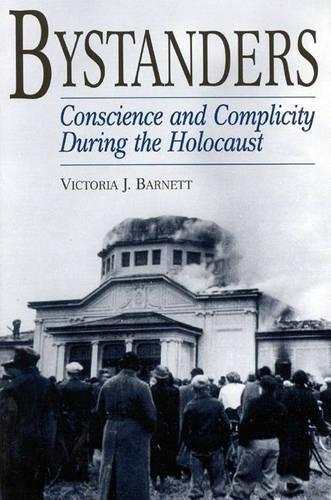
Bystanders: Conscience and Complicity During the Holocaust
(Paperback)
Available Formats
Publishing Details
Bystanders: Conscience and Complicity During the Holocaust
By (Author) Victoria Barnett
Bloomsbury Publishing PLC
Praeger Publishers Inc
30th July 2000
United States
Classifications
Tertiary Education
Non Fiction
European history
Second World War
Modern warfare
The Holocaust
General and world history
940.5318
Physical Properties
Paperback
208
Width 156mm, Height 235mm
312g
Description
The Holocaust did not introduce the phenomenon of the bystander, but it did illustrate the terrible consequences of indifference and passivity towards the persecution of others. Although the term was initially applied only to the good Germansthe apathetic citizens who made genocide possible through unquestioning obedience to evil leadersrecent Holocaust scholarship has shown that it applies to most of the world, including parts of the population in Nazi-occupied countries, some sectors within the international Christian and Jewish communities, and the Allied governments themselves. This work analyzes why this happened, drawing on the insights of historians, Holocaust survivors, and Christian and Jewish ethicists. The author argues that bystander behavior cannot be attributed to a single cause, such as anti-Semitism, but can only be understood within a complex framework of factors that shape human behavior individually, socially, and politically.
Reviews
"The ethical questions [Barnett] raises are as relevant and searing for the bystanders of today as they are for those of the past. Extremely well written, interesting and clear, the book should appeal to students in college-level Holocaust studies courses as well as the general public. It provides a great deal of information about Holocaust history while simultaneously provoking the reader toward moral self-scrutiny."-Pearl Oliner Professor of Education Research Director Altruistic Personality and Prosocial Behavior Institute
"Victoria Barnett's book charts new ground in considering the bystander phenomenon during the Holocaust. Drawing from a wide variety of sources Barnett examines the historical and ethical implications of bystander behavior on three levels: the individual, institutional and international. Scholars and educators will benefit from Barnett's innovative and provocative study."-Mary Johnson National Senior Program Associate Facing History and Ourselves
"Victoria Barnett's new book is a welcome and necessary addition to the scholarship on the holocaust, in particular on its implications for Christians and Christianity....Barnett's lucidly written, accessible book will find a receptive audience in undergraduate and graduate classes as well as among the broader interested public."-Doris L. Bergen Professor University of Notre Dame
"Without flinching, and with sharp distaste for any apologetics, Barnett scrutinizes the behavior of the "bystanders," those who saw and did nothing and then claimed they bore no responsibility. This book is a great achievement and will disturb the complacency of all those who thought they already knew the history of the Holocaust."-Susannah Heschel author of Abraham Geiger and the Jewish Jesus
.,."an excellent model of a psychohistorical study that has been informed by the conclusions derived from experimental psychology. Her study of the psychosocial dynamics behind moral decision making can also help historians look for the patterns of primary data that can prove fruitful in understanding the behaviors of bystanders as they confront such assaults on humanity as those set in motion by the Nazis. She helps historians to answer the questions of why and how normal people watch political murder from the sidelines.""-American Historical Review
...an excellent model of a psychohistorical study that has been informed by the conclusions derived from experimental psychology. Her study of the psychosocial dynamics behind moral decision making can also help historians look for the patterns of primary data that can prove fruitful in understanding the behaviors of bystanders as they confront such assaults on humanity as those set in motion by the Nazis. She helps historians to answer the questions of why and how normal people watch political murder from the sidelines."-American Historical Review
Bystanders is a powerful argument...The theoretical conclusions of Barnett's final pages are so pertinent, so powerful, that I would gladly have seen them all printed in italics. Indeed, were I now teaching an introductory course on Christian ethics in either a church or a seminary I would include this book as mandatory reading.-Christian Century
"Bystanders is a powerful argument...The theoretical conclusions of Barnett's final pages are so pertinent, so powerful, that I would gladly have seen them all printed in italics. Indeed, were I now teaching an introductory course on Christian ethics in either a church or a seminary I would include this book as mandatory reading."-Christian Century
..."an excellent model of a psychohistorical study that has been informed by the conclusions derived from experimental psychology. Her study of the psychosocial dynamics behind moral decision making can also help historians look for the patterns of primary data that can prove fruitful in understanding the behaviors of bystanders as they confront such assaults on humanity as those set in motion by the Nazis. She helps historians to answer the questions of why and how normal people watch political murder from the sidelines.""-American Historical Review
Author Bio
VICTORIA J. BARNETT is a consultant for the Department of Church Relations, U.S. Holocaust Memorial Museum. She has written numerous scholarly articles on religious topics. An authority on the history of the churches during the Holocaust, she is the author of For the Soul of the People: Protestant Protest against Hitler (1992).
